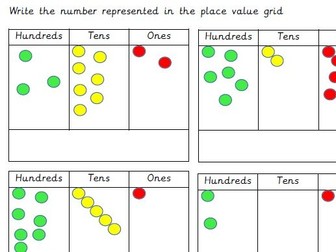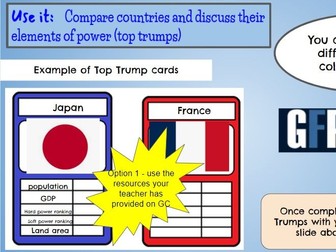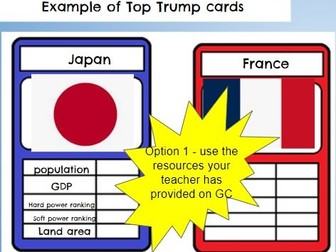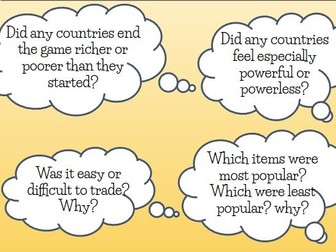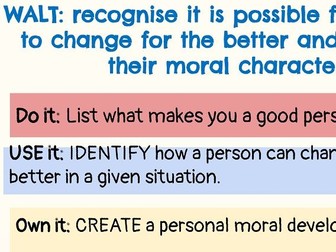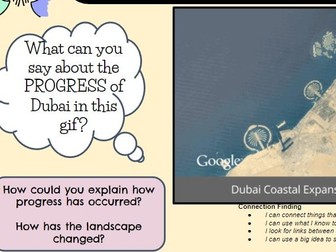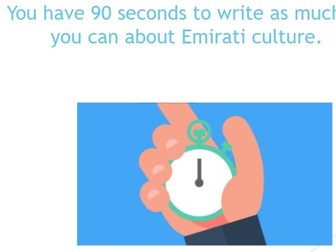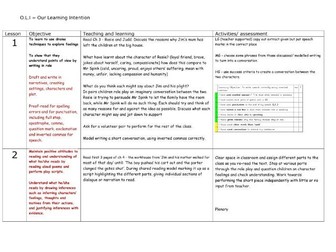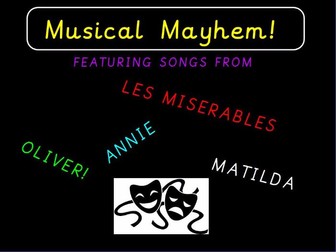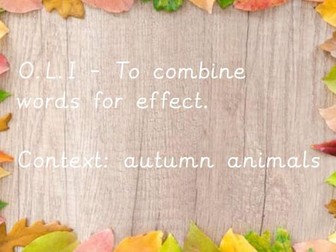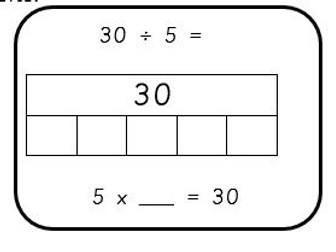
Persuasive writing - Key Stage 2 Context - Plastic pollution in our oceans
A great cross curricular writing topic that gives real purpose for the children’s writing. A series of 11 literacy lessons encourages the children to deconstruct exemplar and comparative texts/ speeches about plastic pollution in our oceans. By the end of the unit the children will write a persuasive speech to raise awareness of this important issue and encourage people to do something to help.
With my class (Y3 - though can be easily adapted for older children) we turned the speeches into a video using ‘Adobe Spark Video’ then tweeted them out and put them on our class website to widen the audience of their work. My children absolutely loved this unit of work and the resulting speeches were fantastic!
All resources and links are given to just download and deliver these lessons. I used Promethean flipcharts to present to the class but these can be easily transferred to a smart board resource or Powerpoint.

Upper Key Stage Two - Geography - linked to the concepts of 'Power and Progress'
A creative sequence of 4 geography based lessons centred around the concepts of ‘Power and Progress’, particularly regarding countries of the world with a particular focus on Dubai and London as cities which have shown huge ‘progress’.
It could easily be adapted to suit a different context or concepts. Learning objectives focused on include:
Interpreting maps using grid references, symbols and keys - children are encouraged to use a map of their school to find information about the power and progress of countries around the world! Discussion over ‘hard’ and ‘soft’ power.
Collect and analyse statistics and other information in order to draw conclusions about a place - children design top trump style cards of countries and create their own metrics for comparing power.
Describe how countries are interconnected and interdependent - use of trading cards linked to natural resources, the children take part in a fun simulation of how international trading works and how countries are interdependent on each other.
Create maps to identify patterns of land use and population density over time. Through a case study of London and Dubai the children look at data and interpret it, discussing the similarities and differences in their growth. Then they create a map of the patterns of land use in Dubai and predict what will occur next.

Interpreting maps using grid references, symbols and keys
designed for Upper Key Stage Two, the children are given a map of school and asked to use the coordinates on their question sheets to find the missing words (which have been placed around school).
It takes a little prep to personalise it to your own school but the results are fantastic and the children love it.
Leads to a good discussion back in class about aspects of power countries possess and exhibit (I linked it to the concepts of Power and Progress we were focusing on).

Collect and analyse statistics and other information in order to draw conclusions about a place
Lesson designed for Upper Key Stage Two (second in a series of 4). The children explore a website which categorises and ranks the power of different countries. They then choose some categories and create Top Trump style cards. After playing the game for a while the class have a discussion about what they found out as well as delving a little deeper into aspects of power.

Describe how countries are interconnected and interdependent
The children initially begin to discover that the items they own are from many different places. This begins the discussion about trade and how countries rely on each other for food, clothing etc.
Using a fun trading game, the children begin to understand this at a deeper level through the ‘trading’ of natural resources.
Some key questions at the end of the session lead to a rich discussion about the activity,
undefined

Moral Education (UAE) - Y6 - Personal Development and Growth
A lesson observed by the KHDA with good feedback received.
Focusing on moral growth and development. The children are encouraged to look at their own qualities, then through analysing some scenarios they identify the qualities that are lacking.
They then go on to create their own moral development plan

Create maps to identify patterns of land use and population density over time
Children compare the similarities and differences of two modern cities (London and Dubai) through looking at maps and line graphs of population growth.
The children think about some key questions linked to this before shading their own map of Dubai and the pattern of land use so far and what they think may happen in the future!

Understand UAE culture
Children learn about key elements of Emirati culture and then they write a poem incorporating their learning. (lower Key Stage Two but could easily be adapted)

WW2 Context for Maths code breaking lesson - column addition/ grid multiplication
An engaging activity which involves solving codes and completing mini challenges that will allow children to apply their calculation skills.
The children can use iPads to scan the QR codes to unlock each video and lead them on to the next challenge.
When I taught this, each challenge was in a separate envelope sealed with a ‘Top Secret’ label which made the activity a little bit more special.

Street Child - Berlie Doherty Literacy planning KS2
Approximately 5 weeks of literacy plans based on the book ‘Street Child’ by Berlie Doherty. Designed initially for lower Keystage Two though can be easily adapted. All resources included alongside success criteria marking ladders for longer writing pieces. A fabulous book that engages the children in the topic of the Victorians. A mixture of drama, narrative, poetry and non-fiction. History objectives can be taught alongside.

Addition and subtraction Y3 (Based on White Rose resources)
Lesson plans for mental addition and subtraction strategies leading up to column addition/subtraction. Tailored worksheets based on the White Rose Maths (block 2) planning. Hope they are helpful!

Musical Performance featuring songs from Oliver, Les Mis, Matilda and Annie
Script for a class performance or drama club, could be extended to more children. When I put this on it featured 240 children!
Abridged script of Les Miserables written especially for this performance. I originally added extra drama bits for Oliver and Matilda but have shortened slightly for this resource. All songs and instrumental sound tracks can be found online.

Autumn animals poem
Nice little lesson (or possibly two) on creating a poem about animals you might see in autumn. Magpieing the structure off another poem the children think carefully about the different elements needed to create each verse e.g. verb to describe how the animal is moving/ what it looks like/ what it is doing.
Also included is a planning sheet to record ideas and enable working collaboratively, scaffolded sheet for the lower achievers and supporting vocabulary, as well as simile ideas they may want to include.
A self assessment checklist is also included.

Division using bar models
Created for my Year 3 class to help them understand how to use the bar model to divide. Differentiated sheets are given with suggested extensions.

Subordinating conjunctions - differentiated worksheets ('A Long Way Home' context)
Made for my Year Three class but could be adapted.

Butterfly Lion - Literacy - Exploring character's feelings using drama
lesson plan and promethean resource which uses drama to explore the feelings of characters in the story.

Website resources for a variety of subject areas
I spent a long time collating useful resources for different topic areas and thought I’d share and hopefully save someone else the job!

Cliffhanger - Jacquline Wilson - letter writing
Flipchart resource which asks the children to write a letter in the character of 'Tim'.

Representing multiplication in different ways
A useful way to help children understand the different ways multiplication can be shown, as well as the various terminology used.

Analysing TV adverts - Persuasive writing
Promethean resource with suitable links for chocolate/sweet adverts that use different techniques to persuade various audiences.
